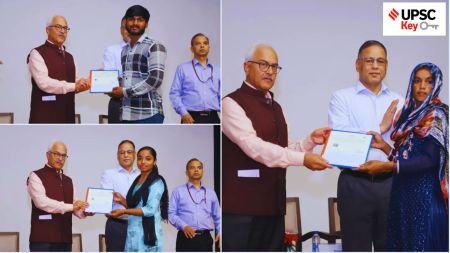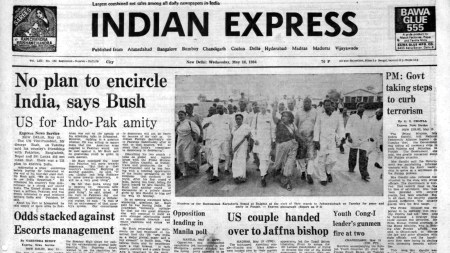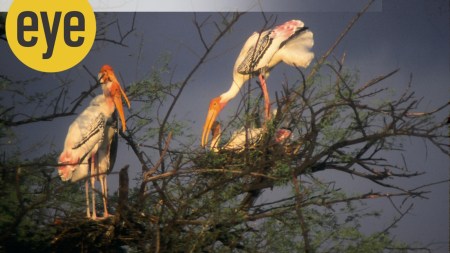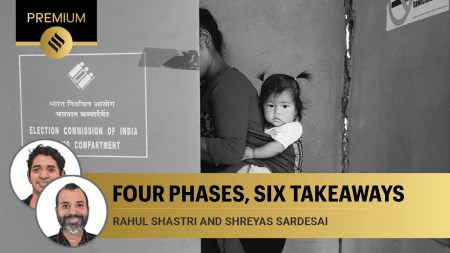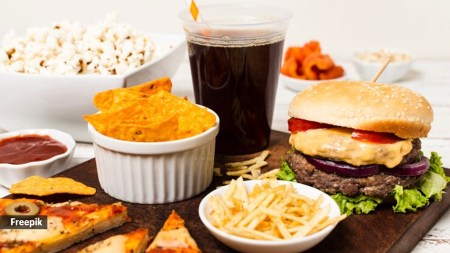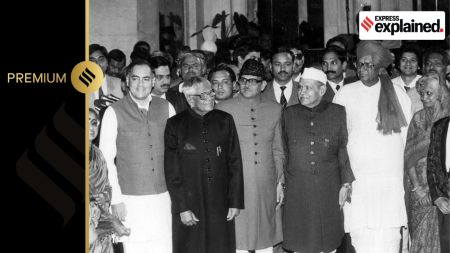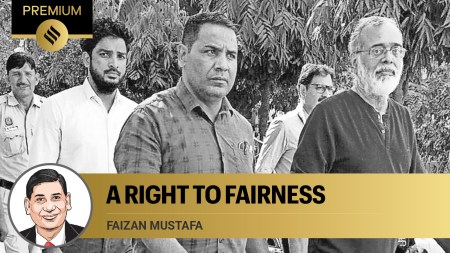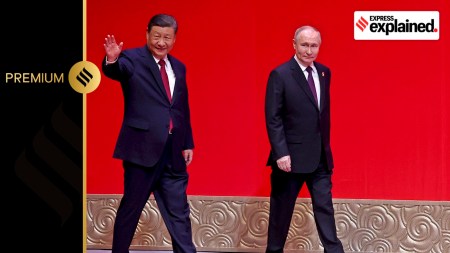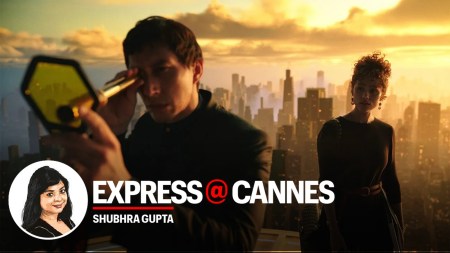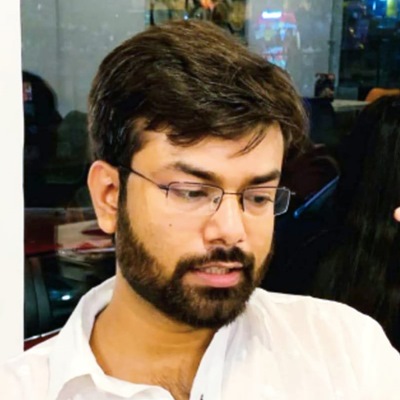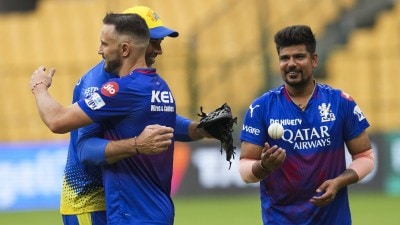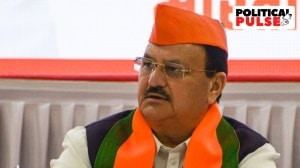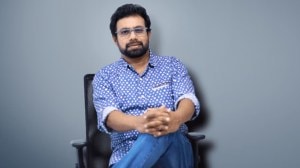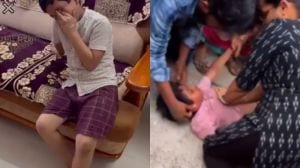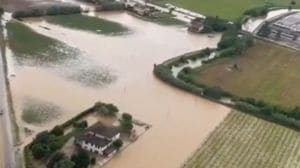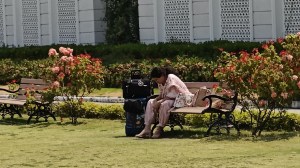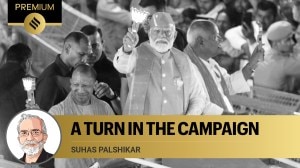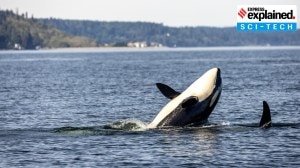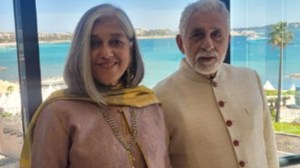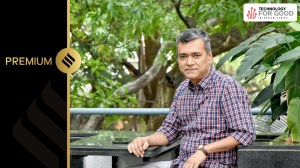- India
- International
UPSC Weekly Current Affairs Quiz | April 28 to May 04, 2024
Brush up your current affairs knowledge with this week's top 15 questions and consolidate your UPSC-CSE preparation. Find answers along with explanations at the end of the quiz.
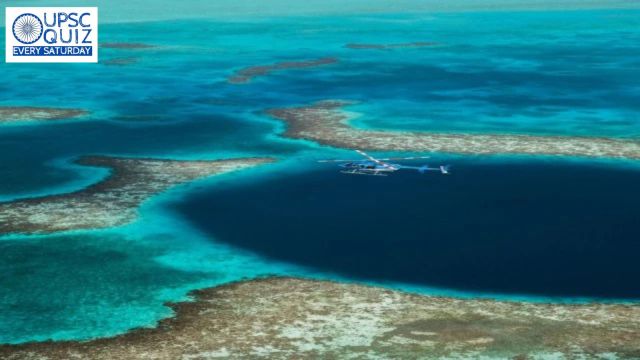 Researchers have identified what might be the "world's deepest blue hole," extending so deeply that its bottom remains unexplored. Find a question on blue hole in today's quiz. (Representational/ X@Astrumheli)
Researchers have identified what might be the "world's deepest blue hole," extending so deeply that its bottom remains unexplored. Find a question on blue hole in today's quiz. (Representational/ X@Astrumheli)UPSC Weekly Quiz is a current affairs-based quiz on relevant topics from the past week, curated for the aspirants of competitive examinations. Attempt the weekly quiz every Saturday and find answers to the MCQs with explanations at the end of the article.
🚨 The Indian Express UPSC Essentials brings to you the April edition of its monthly magazine. Click Here to read. Share your views and suggestions in the comment box or at manas.srivastava@indianexpress.com🚨
QUESTION 1
With reference to the Thrombosis with Thrombocytopenia Syndrome (TTS), consider the following statements:
1. It is characterised by abnormally low levels of platelets and the formation of blood clots.
2. Thrombosis can block the blood flow in both veins and arteries.
3. The symptoms associated with TTS include breathlessness and pain in the chest or limbs.
How many of the statements given above are correct?
(a) Only one
(b) Only two
(c) All three
(d) None

QUESTION 2
Sierra Madre was constructed in the US for World War II (1939-45) and commissioned in 1944 as a landing ship. In 1999, the Sierra Madre was left on the Second Thomas Shoal, which is a part of the mostly uninhabited Spratly islands in the South China Sea. It has created tensions between:
(a) US-China
(b) China-Japan
(c) US-Japan
(d) China-Philippines
QUESTION 3
Shaksgam valley was recently in news due to illegal construction activities carried out by China. The valley is located in:
(a) Aksai Chin
(b) Arunachal Pradesh
(c) Ladakh
(d) Pakistan occupied Kashmir
QUESTION 4
He was known for being one of the leaders of the Self Respect movement in the Madras Presidency and for his fight for the rights of backward classes, passed a resolution stating the government should allow everybody a national holiday on Labour Day.
Who is ‘he’ in the above lines?
(a) Dheeran Chinnamalai
(b) V. O. Chidambaram Pillai
(c) Ukkirapandi MuthuramalingaThevar
(d) Singaravelu Chettiar
QUESTION 5
With reference to the Monkeypox virus, consider the following statements:
1. The monkeypox virus is an orthopoxvirus.
2. The symptoms of monkeypox are similar to smallpox.
3. The disease cannot be transmitted from infected animals to humans.
4. Recently, Congo declared the outbreak across the country a health emergency.
How many of the statements given above are correct?
(a) Only one
(b) Only two
(c) Only three
(d) All four
QUESTION 6
Consider the following statements:
1. The President and the Governors shall not be answerable to any court for the exercise and performance of the powers and duties of his office.
2. Criminal proceedings can be initiated against the President, or the Governor of a State, in any court during the term of his office.
Which of the statement(s) given above is/are correct?
(a) 1 only
(b) 2 only
(c) Both 1 and 2
(d) Neither 1 nor 2
QUESTION 7
With reference to the swell waves, consider the following statements:
1. These waves are formed by an ocean swell due to local winds.
2. Swell waves are faster than tsunami waves.
Which of the statement(s) given above is/are correct?
(a) 1 only
(b) 2 only
(c) Both 1 and 2
(d) Neither 1 nor 2
QUESTION 8
Consider the following statements:
1. The government health expenditure (GHE) as a proportion of GDP has increased between 2014-15 and 2021-22.
2. There has been a consistent increase in Out-of-Pocket Expenditure (OOPE) as a share of the total health expenditure between 2014-15 and 2019-20.
3. The expenditure on government-financed insurance has decreased between 2013-14 and 2021-22.
How many of the statements given above are correct?
(a) Only one
(b) Only two
(c) All three
(d) None
QUESTION 9
Lipulekh, Limpiyadhura and Kalapani are the disputed territories between:
(a) India-Nepal
(b) Nepal-Bhutan
(c) India-China
(d) Nepal-China
QUESTION 10
Consider the following minerals:
1. Copper
2. Lithium
3. Nickel
4. Cobalt
How many of the above are classified as critical minerals?
(a) Only one
(b) Only two
(c) Only three
(d) All four
QUESTION 11
With reference to History of Press in India, consider the following statements:
1. The first newspaper ever published in India was Hicky’s Bengal Gazette.
2. Hicky’s paper shed a light on government corruption, civic issues, and at times criticised the British East India Company, leading to its closure.
Which of the above statements are true?
(a) Only 1
(b) Only 2
(c) Both 1 and 2
(d) Neither 1 nor 2
QUESTION 12
Consider the following statements:
Statement 1:
The right to vote is a ‘statutory right.’
Statement 2:
Voting is not a fundamental right and can be repealed.
Which one of the following is correct in respect of the above statements?
(a)Both Statement-I and Statement-II are correct and Statement-II is the correct explanation for Statement-I
(b)Both Statement-I and Statement-II are correct and Statement-II is not the correct explanation for Statement-I
(c)Statement-I is correct Statement-II is incorrect
(d) Statement-I is incorrect Statement-II is correct
QUESTION 13
With reference to Blue holes consider the following statements:
1. Blue holes are also known as Karst formations.
2. Deepest blue hole on Earth is found in Brazil.
3. These are vertical marine caves that were carved over thousands of years by glacial runoff during the Ice Age.
How many of the above statements are true?
(a) Only one
(b) Only two
(c) All three
(d) None
QUESTION 14
‘Egg skull rule’ recently seen in news is related to:
(a) Cricket
(b) Elections
(c) Monetary policy
(d) None of the above
QUESTION 15
Hamida Banu, also known as ‘Amazon of Aligarh’, is related to which of the following sports?
(a) Badminton
(b) Wrestling
(c) Archery
(d) Kabaddi
ANSWERS TO THE MCQs
1. (c)
FYI:
— AstraZeneca has accepted a link between the vaccine and Thrombosis with Thrombocytopenia Syndrome (TTS).
— Thrombosis with Thrombocytopenia Syndrome (TTS) is a medical disorder marked by low platelet levels and the production of blood clots. Hence, statement 1 is correct.
— TTS is related with a variety of symptoms, including shortness of breath, chest or limb pain, pinhead-sized red patches or bruising of the skin in a region other than the injection site, headaches, body numbness, and so on. Hence, statement 3 is correct.
— Thrombosis can disrupt blood flow in both veins and arteries. The most significant issues are stroke, heart attack, and severe breathing problems. Hence, statement 2 is correct.
Therefore, option (c) is the correct answer.
2. (d)
FYI:
— The Sierra Madre, 100 feet long, was built in the United States for World War II (1939-1945) and commissioned as a landing ship in 1944.
— It was then delivered to Vietnam during the United States’ involvement in the Vietnam War (1954–75). In 1976, it was given to the Philippines, a US ally.
— It was abandoned in 1999 in the Second Thomas Shoal, part of the mostly uninhabited Spratly Islands.
— A few years ago, China claimed the neighbouring Mischief Reef. The measure was an attempt to halt further Chinese accusations.
— However, removing it would weaken the Philippines’ claims to the islands and allow China to establish a presence there.
Therefore, option (d) is the correct answer.
3. (d)
FYI:
— India has issued a strong objection to China for conducting construction activities in the Shaksgam valley in a “illegal” attempt to change the situation on the ground.
— According to Ministry of External Affairs (MEA) spokesperson Randhir Jaiswal, the Shaksgam valley is part of India, and New Delhi never acknowledged the so-called China-Pakistan boundary treaty of 1963, which saw Islamabad “unlawfully” attempt to transfer the land to Beijing.
— The Shaksgam valley is a strategically key region that is part of Pakistan-occupied Kashmir (PoK).
Therefore, option (d) is the correct answer.
4. (d)
FYI:
— In India, May Day was first celebrated on May 1, 1923, after the Labour Kisan Party of Hindustan was initiated and Comrade Singaravelar (Singaravelu Chettiar) helmed the celebrations. In two meetings — one at Triplicane Beach and the second at the beach opposite Madras High Court — the Comrade, known for being one of the leaders of the Self Respect movement in the Madras Presidency and for his fight for the rights of backward classes, passed a resolution stating the government should allow everybody a national holiday on Labour Day.
Therefore, option (d) is the correct answer.
5. (c)
FYI:
— The Democratic Republic of the Congo (DRC) is struggling to contain its biggest Mpox outbreak.
— Congo recently declared the outbreak across the country a health emergency. Cases have been reported in neighbouring Republic of Congo as well. Hence, statement 4 is correct.
— The monkeypox virus is an orthopoxvirus, which is a genus of viruses that also includes the variola virus, which causes smallpox, and vaccinia virus, which was used in the smallpox vaccine. Hence, statement 1 is correct.
— Monkeypox causes symptoms similar to smallpox, although they are less severe. Hence, statement 2 is correct.
— Vaccination eradicated smallpox worldwide in 1980, monkeypox continues to occur in a swathe of countries in Central and West Africa, and has on occasion showed up elsewhere.
— According to the World Health Organisation (WHO), two distinct clade are identified: the West African clade and the Congo Basin clade, also known as the Central African clade.
— Monkeypox is a zoonosis, that is, a disease that is transmitted from infected animals to humans. According to the WHO, cases occur close to tropical rainforests inhabited by animals that carry the virus. Monkeypox virus infection has been detected in squirrels, Gambian poached rats, dormice, and some species of monkeys. Hence, statement 3 is not correct.
Therefore, option (c) is the correct answer.
6. (a)
FYI:
— Article 361 of the Constitution that deals with immunity to the President and the Governors states that they “shall not be answerable to any court for the exercise and performance of the powers and duties of his office or for any act done or purporting to be done by him in the exercise and performance of those powers and duties…” Hence, statement 1 is correct.
— The provision also has two crucial sub-clauses:
(1) that no criminal proceedings whatsoever shall be initiated or continued against the President, or the Governor of a State, in any court during the term of his office. Hence, statement 2 is not correct.
(2) No process for the arrest or imprisonment of the President, or the Governor of a State, shall issue from any court during his term of office.
Therefore, option (a) is the correct answer.
7. (d)
FYI:
— The Indian National Centre for Ocean Information Services (INCOIS) forecasted that high sea waves, also known as swell waves, might hit the coastal areas of Goa, Maharashtra, West Bengal, Odisha, Tamil Nadu, Kerala, Lakshadweep, Karnataka, Gujarat, and Andaman & Nicobar Islands.
— INCOIS cautioned fishermen and coastal population and urged for total suspension of operational/recreational activities at beach/nearshore regions.
— Swell waves are formed by an ocean swell, hence the name swell surge. Ocean swells occur not due to the local winds, but rather due to distant storms like hurricanes, or even long periods of fierce gale winds. Hence, statement 1 is not correct.
— During such storms, massive amounts of energy are transferred from the air to the water, resulting in the development of extremely high waves. Such waves can travel thousands of kilometres from the storm’s centre before striking the beach.
— Unlike swell waves, a tsunami is a succession of massive waves caused by an underwater disturbance, typically earthquakes that occur underneath or near the ocean.
— Tsunamis are approximately ten times faster than swell waves. Although swell waves and tsunamis slow down near the coast, the latter strike land at 30-50 km/h. Hence, statement 2 is not correct.
Therefore, option (d) is the correct answer.
8. (a)
FYI:
— The National Health Policy (NHP) 2017 envisions universal access to quality and affordable healthcare.
— The nation’s commitment to increasing public expenditure on health in recent years is evident from the National Health Accounts (NHA) data, including the provisional estimates for 2020-21 and 2021-22.
— According to NHA data, government health expenditure (GHE) as a percentage of GDP climbed by a record 63% between 2014-15 and 2021-22. It increased from 1.13% of GDP in 2014-15 to 1.35% in 2019-20. Hence, statement 1 is correct.
— The expenditure on government-financed insurance has climbed 4.4 times, from Rs 4,757 crore in 2013-14 to Rs 20,771 crore in 2021-22. This reflects increased investment in the AB-PMJAY and state health-assurance/insurance plans. Hence, statement 3 is not correct.
— Out-of-Pocket Expenditure (OOPE) as a fraction of overall health expenditure has consistently declined, falling from 62.6 percent to 47.1% between 2014-15 and 2019-20. Hence, statement 2 is not correct.
Therefore, option (a) is the correct answer.
9. (a)
FYI:
— Nepal has announced the production of a new Rs 100 currency note with a map of the controversial areas of Lipulekh, Limpiyadhura, and Kalapani, which India has already labelled as “artificial enlargement” and “untenable.”
— Nepal completed the process of updating its political map on June 18, 2020, by modifying its Constitution to include three strategically vital areas: Lipulekh, Kalapani, and Limpiyadhura.
— India maintains Lipulekh, Kalapani and Limpiyadhura belongs to it.
— Nepal shares a border of over 1,850 km with five Indian states – Sikkim, West Bengal, Bihar, Uttar Pradesh and Uttarakhand.
Therefore, option (a) is the correct answer.
10. (d)
FYI:
— Critical minerals such as copper, lithium, nickel, cobalt and rare earth elements are essential components in many of today’s rapidly growing clean energy technologies –- from wind turbines and electricity networks to electric vehicles.
Therefore, option (d) is the correct answer.
11. (c)
FYI:
— On January 29, 1780, Ireland-born James Augustus Hicky published the first edition of ‘Hicky’s Bengal Gazette’, India’s first newspaper. It covered a wide range of issues and later came under the colonial government’s radar. Hence, statement 1 is correct.
— The World Press Freedom Day is annually commemorated on May 3, in recognition of the importance of journalism in society.
— The first newspaper ever published in India was Hicky’s Bengal Gazette, whose inaugural edition went out on January 29, 1780. Ireland-born James Augustus Hicky served as its founder-editor. For many, the Gazette is now seen as a paper largely meant for the British community in Calcutta, and one that centred around gossip and salacious events.
— However, Hicky’s paper also shed a light on government corruption, civic issues, and at times criticised the British East India Company. It was certainly under the radar of British authorities, and was sued for libel around two years into its publication, leading to its closure. Hence, statement 2 is correct.
— In an article, Hickey’s criticised Hastings’ expansion policy in the subcontinent during the 1780s. He described Hastings in an article as being Robert Clive’s “miserable successor”. In another, he called Hastings “Wild, Pusilanimous, disgraceful, and wicked”, and even “Despotic”. He was alleged to have even called troops to mutiny, “because their throats were ‘perhaps devoted to the wild Chimeras of a Madman’”.
Therefore, option (c) is the correct answer.
12. (a)
FYI:
— In 1975, the Supreme Court in the case of Indira Gandhi v Raj Narain recognised that free and fair elections are a part of the ‘basic structure’ of the Constitution of India, and any laws or policies that would violate this principle could be struck down.
— Though free and fair elections have been placed on the highest constitutional pedestal, the Supreme Court has held that the rights to elect and be elected do not enjoy the same status. For instance, a five-judge constitution Bench in 2006, in the case of Kuldip Nayar v. Union of India held that the right to vote (or the right to elect as it was called) is “pure and simple, a statutory right”. This means that voting is not a fundamental right and can be repealed.
— The same was held for the right to be elected by the Bench, ruling that laws enacted by Parliament could regulate both these statutory rights.
Therefore, (a) is the correct answer.
13. (b)
FYI:
— A ground-breaking discovery has sent shockwaves through the scientific community as researchers unveiled the true extent of Mexico’s Taam Ja’ Blue Hole (TJBH), now officially known as the deepest blue hole on Earth. Hence, statement 2 is not correct.
— Blue holes, also known as Karst formations, are geological wonders formed by the gradual dissolution of soluble bedrock such as limestone or gypsum, resulting in the creation of vertical caverns submerged beneath the oceans’ surface. However, the Taam Ja’ Blue Hole’s immense depth presents a unique challenge, pushing the limits of scientific exploration to new frontiers. Hence, statement 1 is correct.
— Blue holes are vertical marine caves that were carved over thousands of years by glacial runoff during the Ice Age, according to Discovery.com. Hence, statement 3 is correct.
Therefore, option (b) is the correct answer.
14. (d)
FYI:
— Underlining that the state and central consumer courts incorrectly applied the ‘eggshell skull’ legal principle, the Supreme Court on April 23 restored the compensation of Rs 5 lakhs awarded by the district consumer forum in a medical negligence case.
— The eggshell skull rule is a common law principle applied in civil litigation. Essentially, when the offender would be liable for all injuries that might be intensified due to the peculiar conditions of the injured person that the offender might not have known. Simply put, the defendant would be held responsible for injuries caused to a person when he hit him on the head, even if the victim had a particularly delicate skull or an ‘eggshell’ for a skull.
— The rule is applied for claiming an enhanced compensation — for damage that is more than what could have been ordinarily anticipated to be caused by the defendant.
Therefore, option (d) is the correct answer.
15. (b)
FYI:
— In a nod to women’s resilience and sporting prowess, Google commemorates Hamida Banu, India’s first professional woman wrestler. Banu’s legacy, forged in the 1940s and 50s, continues to inspire generations.
Who is Hamida Banu?
— Born into a family of wrestlers near Aligarh, Uttar Pradesh, in 1900s, Banu challenged societal norms from a young age. Despite the prevalent discouragement of women’s participation in athletics, she fearlessly pursued her passion for wrestling. Banu issued open challenges to men, competed with them and even offered her hand in marriage to the first man to defeat her.
— Banu’s triumphs echoed across newspapers, earning her the moniker ‘Amazon of Aligarh.’ Her feats, dietary regimen, and rigorous training routine became subjects of widespread admiration and fascination.
Therefore, option (b) is the correct answer.
Subscribe to our UPSC newsletter and stay updated with the news cues from the past week.
May 18: Latest News
- 01
- 02
- 03
- 04
- 05


